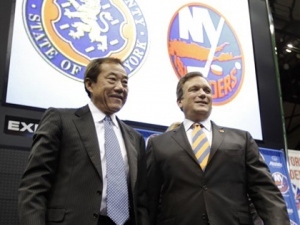The owner of the New York Islanders of the National Hockey League threatened to move his team unless he receives hundreds of millions of dollars of taxpayer backing for a new stadium.
Taxpayers in Long Island and surrounding Nassau County responded with a message that could be interpreted as, “Don’t let the door hit you on the behind on your way out.”
Voters in August overwhelmingly rejected a proposal to borrow $400 million for the Islanders and their billionaire owner, Charles Wang. A minor league baseball stadium also would have been built. The vote was 57-43 percent against.
‘Merely the Beginning’
Nassau County Executive Edward Mangano had spent weeks trying to build election-day support for the borrowing measure.
“Over the course of the past several weeks, we all learned a lot about our county and what is needed to improve our local economy,” he said in remarks at the Nassau Coliseum, where the Islanders play, after the vote totals were in. “I can tell you this, tonight is not the end of our journey, but merely the beginning. In the coming weeks I will explore a path for new opportunities and growth in Nassau County.”
Nassau County has some of the nation’s highest property taxes. And despite being a wealthy county, it has borrowed $100 million annually to cover operating expenses, putting its finances in such bad shape the state took over financial control last year.
‘Voter Suppression Effort’
County Elections Commissioner William Biamonte told WNYC News voters opposed the measure because they saw it as a tax increase. The election itself was tainted, he said.
“That they scheduled this on a Monday, on August 1, in the summer, resonated with voters,” Biamonte said. “They saw this as a voter suppression effort, to try to tilt their vote in the ‘yes’ column, and I think that hurt their credibility.”
Though it was a local measure, the Islanders bond referendum caught the interest of national tax watchdog organizations, including the National Taxpayers Union.
‘Raw Deal for Taxpayers’
“The taxpayers of Nassau County have just affirmed at the ballot box what many citizen groups and economists have pointed out previously: Sports-stadium deals negotiated between owners and politicians can often be raw deals for taxpayers,” said NTU Government Affairs Manager Brent Mead.
“The Islanders stadium plan would have hit taxpayers with a 3.5 percent to 4 percent property tax hike, and upwards of $800 million in bonds outstanding over a 30-year period. These numbers are far more dramatic than the rosy estimates touted by proponents of the arena project.”
Mead pointed out the Islanders could have moved away from Long Island even with a new stadium.
“The good judgment of taxpayers saved Nassau County from a government which is already over $100 million in debt, clearly cannot manage itself, and is under state financial control,” Mead said.
Growing Public Skepticism
New York-based writer Neil deMause is the author of Field of Schemes: How the Great Stadium Swindle Turns Public Money Into Private Profit, and operator of the fieldofschemes.com Web site, which tracks sports subsidies. He said the strong majority vote against using taxpayer money for the Islanders “tells [local officials] they ran the wrong flag up the pole. The thing about arena campaigns is that they never truly die. They just get reanimated with a different kind of subsidy.
“The first time I looked at stadium and arena referendums [in the 1990s], there was a clear split: Anything where the pro side didn’t outspend the con side by at least 30 to 1, the vote failed. The next time I looked, the dividing line was 100 to 1. I haven’t seen spending figures for the Islanders vote yet, but my guess is the problem is that they didn’t spend enough to overwhelm the opposition.”
He said most sports fans and taxpayers for a decade or more have realized sports team subsidies usually fail to fulfill the promises supporters make. Yet many local government officials ignore the economic evidence and the skepticism of the citizens they represent “because they don’t realize—or they convince themselves—it’s not true” that sports subsidies provide little or no economic benefit to a community.
77 Acres for Development
Mangano said he intends to keep the Islanders at the Coliseum and “still pursue a sports entertainment destination.” The stadium lease with the Islanders expires in 2015.
He announced the county wants developers to submit proposals that could be used to draw up a request for proposal (RFP) for redevelopment of the current stadium property, including approximately 77 acres surrounding the Coliseum.
At a press conference he told reporters, “As you know, over the last two weeks there have been several statements that there are several privately financed proposals that would achieve that purpose. We’d like to see those proposals before drafting a new RFP, and we’ll take it into consideration while drafting a new RFP.”
Several years ago Wang proposed the “Lighthouse at Long Island,” a multibillion-dollar project that would have used all private funding to rebuild the Coliseum and develop the nearby area with houses, a five-star hotel, restaurants, offices, stores, and other amenities. That proposal has not received local government approval.
Steve Stanek ([email protected]) is a research fellow at The Heartland Institute and managing editor of Budget & Tax News.



